Omphaloskepsis Blog
Sometimes the universe speaks to us ŌĆō rather loudly.
Nov 6, 2010
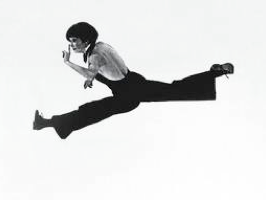
“There is a choice to be disciplined in an area where you can succeed, and if you have a dream that is outside of that area, you should re-address that dream, that’s the beginning of discipline, you can’t enforce discipline any more than you can enforce heart.” -Twyla Tharp
On a whim, last night I took my 9 year old to the Twyla Tharp PNB performance opening. We got rush tickets. I was interested in what Tharp had said about the creative process and how making art was for sharing. A resounding yes! And so a strong pull I didn’t understand and didn’t bother trying to fight got me to the ballet last night. No time to change after the children’s math lesson, better to be there in jeans and clogs than not be there at all. (Although, Chloe changed in the car, and I did manage a gorgeous scarf).
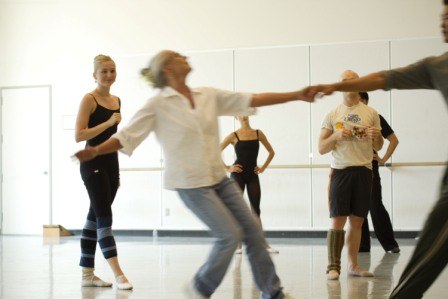
The loudest voice in my head about Twyla is Robin Williams’ doing his Twyla interpretation saying, “and Twyla, and Twyla, and Twyla.” Robin got his big break in Mork and Mindy, written by Tom Tenowich at NBC. Tom was my mother’s 3rd grade student in a parochial school in Philadelphia when she was Sr. Mary Andrea. And when I was disowned and alone on the west coast with my baby son, my mom called me with Tom Tenowich’s contact info at NBC, secretly trying to help me survive. It must have been an enormous sacrifice for her to reopen those doors to her own past.
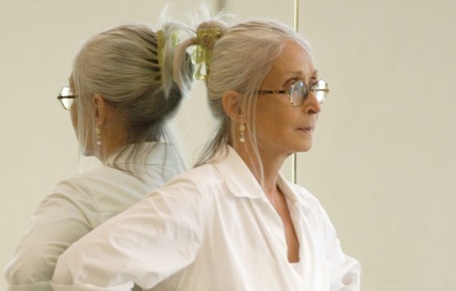
But here we were, Chloe and I, sitting in these great orchestra seats at the ballet. “Twyla Tharp is here somewhere tonight,” I told here with great excitement. The two of us turned to look for her, discussing the possibilities. Comparing the two photos directly above as reference, we scouted two potential Twyla’s and were just debating the plausibility of our choices when we were distracted by the minor last minute activity at the empty seat directly in front of Chloe. Chloe looks back at the picture (above) and says, “mommy, it’s the same earrings and glasses!” And there in front of Chloe was Twyla Tharp! With a well-suited-for-her choppy short haircut.

I like this photo because it best seems to capture what she looked like in spirit, personality, (except a little more hip with the great haircut). And guess what? I wasn’t the only one in jeans there anymore.
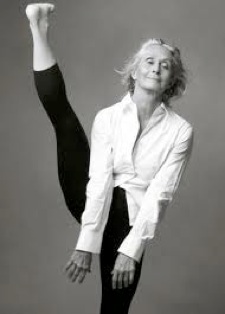

It was difficult to concentrate on the performance on stage, Tharp was so active, physically in her seat. She was working. There were two intermissions and as soon as the lights came up she made a mad dash for the stage. I would have liked to have talked with her, I tried but it wasn’t the right time, she was clearly pre-occupied.
But the timing of this (and what happened last month at the TED conference) seems right for my own internal processes. I’ve been assessing my year, taking back my self and organizing my next steps (no pun intended). The things that Twyla has said in interviews are things that I’ve said to my students or things that I believe or ways that I live or just plain validating to me professionally and I think they’re important to record here.
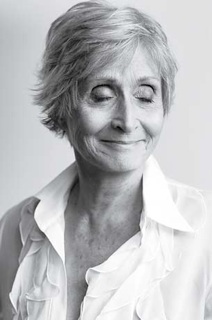

What I observe, watching and reading her interviews that I most relate to is her great sense of urgency to create the work she must create. I also love her 2008 Stranger interview “American Dancer Twyla Tharp: The Cranky Grande Dame of American Dance” when she told Brendan Kiley six times that she didn’t see other artist’s dance performances. “I work” was what she kept telling him. That assuaged my guilt about not seeing other artists’ shows because I make the choice to work over visiting with other artists. And I love that she reads vociferously-quality material.
In the 2008 Washington Post interview “The Kennedy Center Honors: Twyla Tharp” By Sarah Kaufman, she talks about artists and being an artist and self respect. "Well, it's an old story," Tharp says. "It's called independence. It begins with Mozart. Haydn wasn't liberated. Haydn accepted that he ate in the kitchen with the servants and he wore the livery. Mozart wanted to eat at the table. It's about having control over the work that you do and controlling what you will do, and that is part and parcel of having the wherewithal to do it." You get the sense that the control and respect are more important to Tharp than actual wealth.”
 MENU
MENU